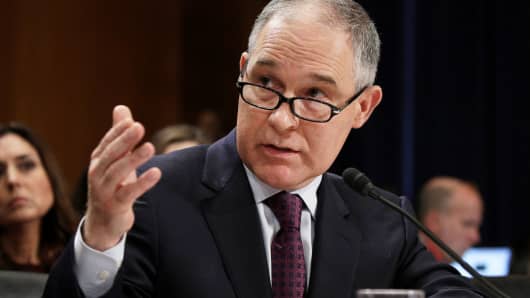Pruitt certainly isn't alone. Several of his Cabinet colleagues have been accused of excessive travel and furniture spending, as well as conflicts of interest. HUD Secretary Ben Carson, for instance, was ridiculed for purchasing a $31,000 dining room set that will probably go nicely with the $139,000 office door bought by Interior Secretary Ryan Zinke.
There have been other ethics controversies: official resources used for partisan purposes in violation of the Hatch Act; White House staffers without proper security clearances; and political appointees handling issues on which they previously lobbied. The Presidential Personnel Office, which screens potential appointees for ethics issues, has been plagued by its own problems, including staffers with inflated resumes and arrest records.
To be sure, every administration gets tripped up by the government ethics rules. However, the sheer number of improprieties involving Trump officials has been stunning. What's also stunning is the lack of consequences when these problems have come to light.
Despite HHS Secretary Tom Price stepping down last year due to his use of charter flights, Pruitt has managed to hold onto his job and still retains the President's "full confidence" after the latest round of disclosures. As for the Hatch Act violations, they have barely resulted in slaps on the wrist. And political appointees are still working on issues where they might have a conflict of interest.
Over the past 15 months, what were once thought to be hard and fast ethics rules have turned out to be far more porous, especially when the enforcement depends on a president with his own ethical challenges.
New ethics laws may very well be needed to tighten up financial conflicts of interest and reduce wasteful spending. But make no mistake: legislation alone won't ensure compliance by thousands of political appointees unless the occupant of the White House makes ethics a priority – and reinforces that commitment every day through his words and actions.
As an example, President Obama mandated on his first full day in office in January 2009 that his appointees would abide by the toughest ethics standards in history, which required extensive training and constant vigilance.
When the Obama White House staff received its first ethics briefing in early 2009, the "ethics czar" Norm Eisen issued a stern warning: "Historically, at least one person in every administration goes to prison. My job is to make sure you stay out of trouble."
Political appointees throughout the government were expected to scrutinize their meetings, gifts and trips to ensure compliance with both the letter and spirit of the ethics rules. When requests for ethics exceptions were elevated to Norm Eisen, he rejected them so often that he earned the nickname "Dr. No."
To guard against conflicts of interest, the White House personnel office and an army of vetting attorneys carefully examined the employment histories and financial records of every appointee. As a backstop, vetting interviews usually ended with this question: "Is there anything else you haven't disclosed that would embarrass you or President Obama?"
This policing of ethics was cumbersome and time-consuming and often frustrating. We couldn't take every trip we wanted, we couldn't upgrade outdated furniture, and we couldn't hire certain people. And despite the safeguards, there were still ethics lapses. Nevertheless, we understood that constant attention to ethics is critical to a well-functioning government.
The American people pay taxes and hope that public officials will be good stewards of their hard-earned dollars. Businesses comply with regulations and expect regulators to enforce the laws fairly. Civil servants work to advance the public good and not enrich themselves, and want to believe that their leadership is guided by the same principle.
When senior officials like Scott Pruitt thumb their noses at ethics rules that millions of civil servants dutifully follow, they reinforce an unfortunate perception that the system is rigged in favor of the wealthy and well-connected, rather than average Americans.
When the President turns a blind eye to the transgressions of his Cabinet – and even encourages them through his own behavior – he accelerates this erosion of the government's integrity and legitimacy.
Once this public confidence is lost, it will take more than a few new ethics laws to restore it.
Commentary by Chris Lu, who served in the Obama Administration as White House Cabinet Secretary and Deputy Secretary of Labor. He is now a senior fellow at the University of Virginia Miller Center. Follow him on Twitter at @ChrisLu44.
For more insight from CNBC contributors, follow
@CNBCopinion
on Twitter.


